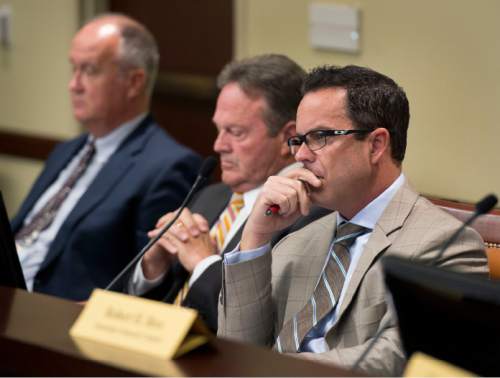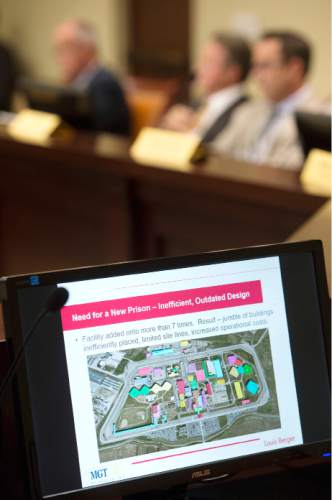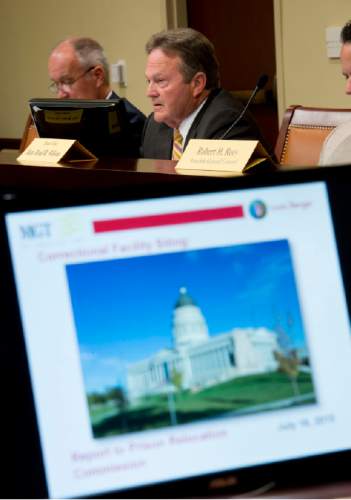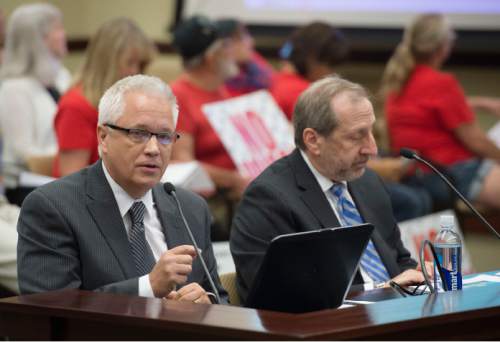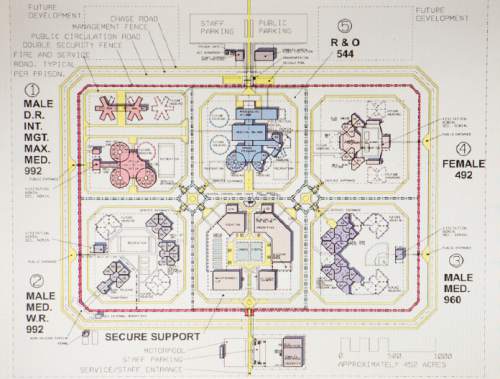This is an archived article that was published on sltrib.com in 2015, and information in the article may be outdated. It is provided only for personal research purposes and may not be reprinted.
Building a new prison on the western fringes of Salt Lake City may take as much as $132 million just to prepare the ground and bring in utilities, the most of any of the four locations under consideration.
Even so, consultants believe this plot, past the airport and nearby industrial parks, offers the greatest chance to attract nearby business growth, multiplying the economic effect of such a major project.
That's just one example of the factors the Prison Relocation Commission will have to weigh as it makes a recommendation by its new deadline of Oct. 1.
Commission members gathered Thursday and voted to give themselves two additional months to plow through stacks of technical reports, some of which are not yet complete.
They also received an update from their consultants, who not only listed pros and cons for each site, but also combated persistent arguments from opponents of the move who want to keep the prison in Draper.
Brad Sassatelli, the lead consultant, said it would be "almost insurmountable" to build a new prison on the current site, while still operating the existing lockup, arguing that it would greatly expand the expected three-year construction period, increase costs and create a potential safety hazard.
He suggested building there would make it easier for inmates to obtain contraband and weapons.
"We don't like to say it," Sassatelli added, "but it happens."
Commission co-chairmen, Jerry Stevenson, a state senator from Layton, and Brad Wilson, a House member from Kaysville, said they asked Sassatelli to address the potential of building in Draper as a way to respond to outside groups and mayors in the other potential locations, who are unified in their calls to keep the prison where it is.
At the same time, Stevenson said he is under no illusion that this presentation would end that debate. "This issue will not be put to rest until we have a new facility."
The four sites under consideration include the one in Salt Lake City, one behind the Wal-Mart Distribution Center in Grantsville and two in northern Utah County (one in southern Eagle Mountain, the other in Fairfield).
Sassatelli said the cost for a new 4,000-bed prison would be about $550 million no matter which site is picked, though neither he nor consultant Bob Nardi offered any information on the cost of each plot, which both said was still being negotiated.
While all the potential sites are viable, Nardi said, they have obstacles. It appeared the properties in Grantsville and Fairfield were more problematic than those in Salt Lake City and Eagle Mountain, though Nardi cautioned that this was just a slice of the information needed to make a final call.
Here is a summary of what the commission learned about the prison finalists:
Salt Lake City
The site • More than 5,000 acres near Interstate 80 and 7200 West.
Positives • The land is level and isolated and doesn't appear to have any endangered species, major cultural resources or contaminants. It is close to hospitals and courts, reducing costs of transporting inmates. It has easy access to major roadways and would likely spur economic development because it would bring utilities to an area near industrial parks and Salt Lake City International Airport.
"There is tremendous potential for economic spinoffs," Nardi said.
Obstacles • The soil is soft and would require more than $60 million to prepare it to handle prison buildings. That's by far the most of the four sites. This geotechnical work could take roughly 18 months, though some other building activities could happen at the same time.
Bringing utilities (electric, gas, water, telecom) could cost $35 million to $65 million and would likely require a revamped wastewater-treatment plant.
Consultants want more time to study the area's wetlands near the Great Salt Lake. Nardi said there are wetlands around the edges of this property but believes it won't be difficult to find the 500 acres needed to build a new prison.
Grantsville
The site • More than 4,000 acres near State Road 138 by the Wal-Mart Distribution Center
Positives • No major environmental concerns and good bedrock to build upon. While they saw some owls, consultants don't believe there's an endangered-species issue.
Obstacles • This land is on a hill and crews would need to flatten it before building. That could cost as much as $34 million. The estimated utility tab is high, as much as $79 million, because the state would have to build out the water and wastewater treatment.
Nardi was moderately concerned about road access in and out of this area, which is limited to reaching Interstate 80.
Eagle Mountain
The site • About 600 acres at the southern edge of the city owned by the founder of Eagle Mountain.
Positives • It is flat, solid ground with no environmental concerns. The owner is willing to cut a deal that may cover some of the utility costs. A nearby wastewater-treatment plant can support a prison. This site is the cheapest, according to the cost estimates released Thursday.
Obstacles • Getting water and other utilities, such as electricity and gas, to the place would be costly, somewhere between $38 million and $45 million. And the state would have to expand road access to the area, which is now reached by a dirt road, at a cost of roughly $20 million.
Fairfield
The site • Roughly 2,700 acres outside the small town of Fairfield, which is west of Eagle Mountain.
Positives • This large site is flat and has no environmental concerns. It also sits near State Road 73, which can handle significant traffic.
Obstacles • It is near Camp Floyd, a historic spot, and Nardi said it is likely that crews would uncover "prehistoric sites" in the area.
This location was by far the most distant from utilities, with water lines more than 10 miles away and electricity at least 15 miles out. The state would also have to negotiate for the water rights, which could pose a significant hurdle.
The utility costs alone are expected to run $67 million to $84 million.
Like the Grantsville site, Nardi is concerned about limited access, particularly if that roadway is shut down during an emergency.


